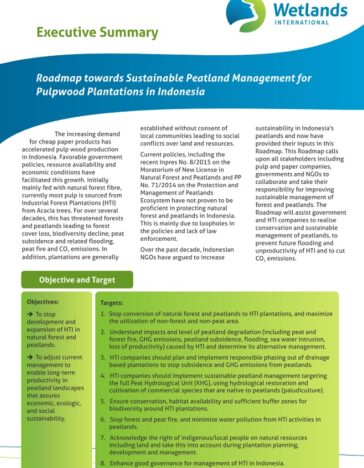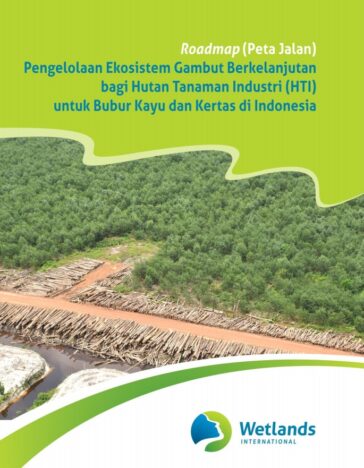
Indonesian Civil Society presents a Roadmap towards sustainable peatland management for pulpwood plantations
-
Peatland conservation and restoration
Bogor, Indonesia. Civil society in Indonesia today presents a Roadmap towards sustainable peatland management for the Indonesian pulpwood plantation industry. The roadmap aims to stop further expansion and new developments of plantations in peatlands and promote alternative sustainable peatland management practices. This is to ensure long-term productivity in peatland landscapes that assures economic, ecological and social sustainability.
- The roadmap shows the pulp-and-paper industry in Indonesia the way towards sustainable peatland management by preventing future peatland fires and flooding, reducing CO2 emissions and conserving biodiversity in peatlands.
- Current practice on peatlands (business as usual) will lead to the large scale loss of productivity for pulp-and-paper industries.
- Government must close loopholes in the existing regulations and endorse laws to enable sustainable peatland management.
For several decades, the rapid expansion of Acacia plantations and the use of natural fiber by the pulp-and-paper industry have threatened forests and peatlands. Indonesian civil society has long argued for sustainable use of forest and peatlands. Civil Society Organizations such as WWF, Jikalahari, Scale-Up, JMGR, WBH, WARSI and Sampan coordinated by Wetlands International have been actively involved in the development of this roadmap.
The roadmap is released at a time that we can’t afford to lose more forests and peatlands in Indonesia. The fire and haze incidences have threatened the health of millions of people and contribute to the loss of iconic biodiversity. The pulp-and-paper companies need to take their responsibility in resolving these issues. There is also an urgent need for Indonesia to re-arrange forest and peatland management and to cut the disproportionally large CO2 emissions from peatland drainage and fires. This is especially relevant in relation to the new climate deal that will be discussed at the 21st UNFCCC summit in Paris.
Reza Lubis of Wetlands International Indonesia said: “the industry needs to take its responsibility. Civil society jointly worked on this roadmap, showing the way for the pulp-and-paper companies and government to work towards sustainable management of forests and peatlands. This needs to be done with appropriate safeguards for biodiversity and in full respect of the rights and livelihoods of local communities.”
Pulp-and-paper industry will lose if it doesn’t change its business significantly
Recent research has provided evidence that continued drainage of the lowland peatlands in Indonesia will cause severe soil subsidence, inevitably leading to large scale flooding of thousands of square kilometers. This will lead to the loss of these areas for agricultural and forestry productivity (including Acacia plantations) and impact on the livelihoods of the local communities that depend on these land areas for their livelihood.
Strategies towards a sustainable peatland management for pulp and paper industry
The CSOs have defined eight targets and developed seven strategies and milestones within a time frame that runs until 2025. Recommendations in the roadmap include the need for the industry to immediately stop new developments in peatlands and natural forests, restore inactive degraded peatlands, phase-out existing drainage-based plantations on peat, and swap concessions on peat to non-peat and non-forest areas. It also provides recommendations for rewetting of drained peatlands and for piloting and up-scaling of sustainable commercial use of rewetted peatlands with native species (peat swamp forest tree species that require no drainage).
These recommendations comply with the new Instruction from the Ministry of Environment and Forestry, stipulated in 5 November 2015, which urges local government to halt issuing of new licenses on peatland and forbid industries to open undeveloped peatland (including in licensed concessions) and prohibits planting burnt peatlands which are under investigation. To protect the peat domes, companies urgently need to block the canals and maintain water levels in the existing plantations as required in the new peat legislation PP71/2014. Companies are further supposed to re-arrange their annual work plan (RKT) and 10 year plan (RKU) and report these to local and central government.
Download the Roadmap summary (in English):
Download the full Roadmap (in Bahasa):


